
How Artificial Intelligence in CRM is Transforming Customer Relationships?
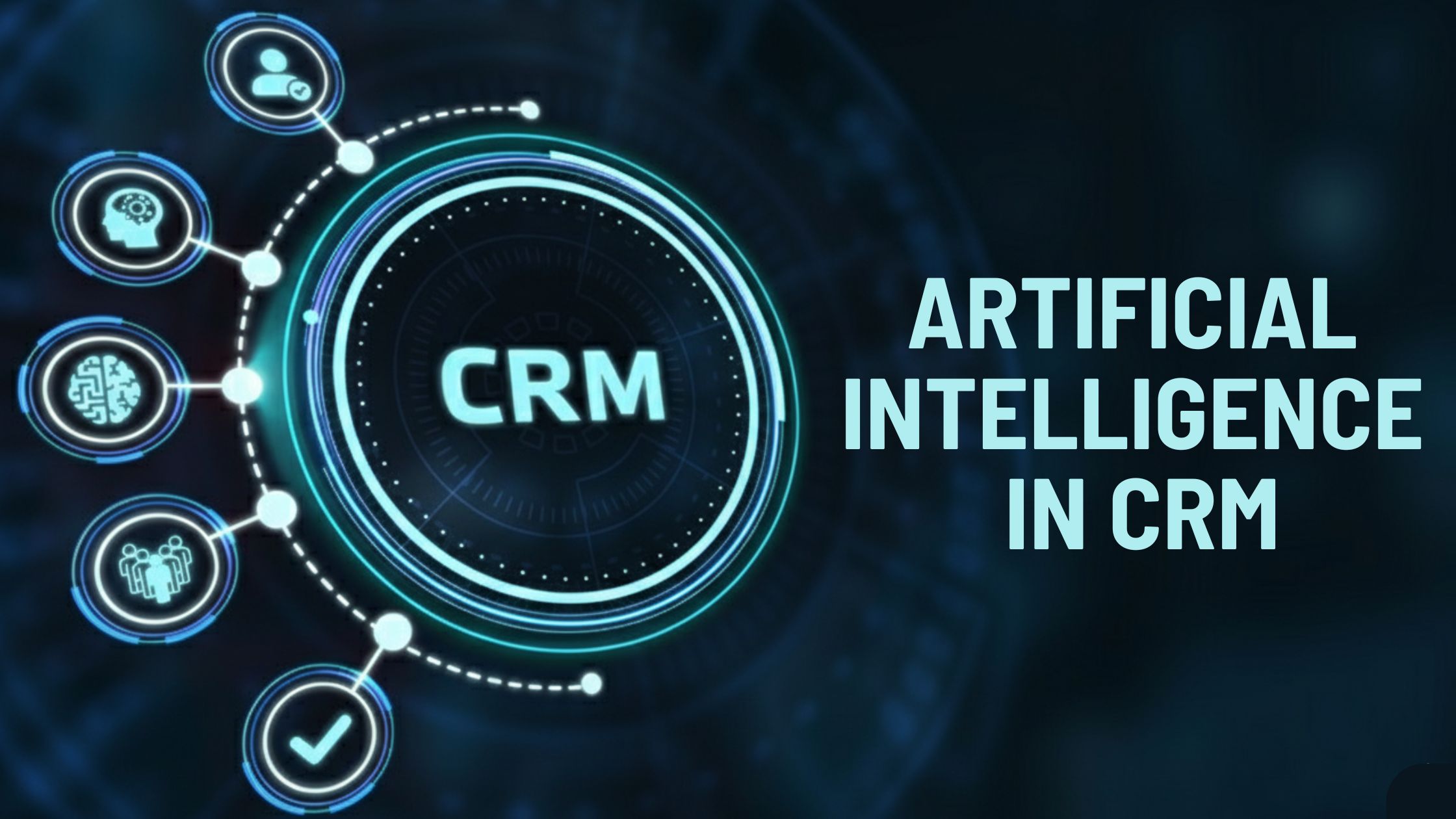
Blog Summary:
In this blog, we’ll explore how Artificial Intelligence in CRM is reshaping the way businesses interact with customers. From boosting personalization to improving sales forecasting, AI-powered CRM solutions are transforming customer relationship management into a smarter, data-driven ecosystem.
You’ll also discover key benefits, real-world use cases, top AI CRM platforms, and practical steps to integrate AI into your CRM system. Toward the end, we’ll highlight how BigDataCentric can help drive CRM success with innovative solutions tailored to your business.
Customer relationship management has long been the backbone of building trust and loyalty between businesses and their customers. However, as customer expectations evolve and data volumes continue to grow, traditional CRM solutions often fall short in delivering real-time insights and personalized engagement. This is where Artificial Intelligence in CRM becomes a game-changer.
By integrating AI into CRM software, businesses can automate repetitive tasks, predict customer behavior, and create more meaningful interactions at scale. From intelligent chatbots that handle customer queries instantly to predictive models that forecast sales outcomes, AI is redefining the future of CRM.
Companies across industries are leveraging these innovations to stay competitive, streamline operations, and strengthen customer connections.
For example, modern CRM platforms now combine automation, business analytics, and AI-driven insights to optimize lead management, customer support, and targeted campaigns. This not only enhances productivity but also creates opportunities for businesses to provide proactive, personalized experiences that boost retention and long-term growth.
What is Artificial Intelligence in CRM?
Artificial Intelligence in CRM refers to the integration of advanced machine learning, predictive analytics, and automation technologies into customer relationship management systems.
Instead of relying solely on manual data entry and static reports, AI-enabled CRM solutions analyze massive amounts of customer data in real time to provide actionable insights.
At its core, AI in CRM is designed to help businesses understand customer behavior patterns, anticipate needs, and create personalized experiences at scale. For instance, AI algorithms can identify buying signals from customer interactions, prioritize leads most likely to convert, and recommend the best communication approach.
An AI CRM platform also reduces the burden of repetitive administrative tasks such as data entry, scheduling follow-ups, and managing customer inquiries. By automating these processes, teams can focus more on building meaningful relationships rather than handling routine tasks.
Ultimately, AI-powered CRM software turns a business’s customer database into a proactive decision-making tool. Instead of simply recording past interactions, it learns continuously from customer journeys, enabling companies to improve strategies and prepare for the future of CRM.
How Businesses Can Use Artificial Intelligence in Their CRM Strategy?
Artificial Intelligence in CRM is not just about automating tasks—it’s about aligning customer data with smarter decision-making. Businesses can use AI in CRM strategies to enhance personalization, streamline workflows, and improve the overall customer journey.
The idea is to shift from reactive interactions to proactive engagement, where customers feel understood at every touchpoint.
AI-powered CRM software allows companies to predict customer intent, segment audiences with precision, and optimize sales pipelines. It also equips customer-facing teams with real-time insights, enabling faster responses and more tailored communication. By embedding AI into CRM solutions, organizations can strengthen retention, increase lead conversions, and stay ahead in competitive markets.
Below are some of the most impactful ways businesses can apply AI within their CRM strategy:
Automated Emails
AI-driven CRMs can generate automated yet highly personalized email campaigns based on customer behavior and preferences. Instead of sending generic messages, businesses can deliver content that resonates with each recipient, whether it’s a product recommendation, a follow-up after purchase, or a reminder about abandoned carts.
This level of personalization improves engagement rates and helps maintain consistent customer communication.
Segmentation
Traditional segmentation often divides customers into broad groups. With AI, segmentation becomes far more detailed and dynamic. AI CRM platforms analyze demographics, purchase history, browsing behavior, and interaction patterns to create micro-segments.
These allow businesses to target specific audiences with messaging that directly matches their needs, increasing the chances of conversions.
Customer Insights
AI in CRM enables deeper insights into customer journeys by analyzing unstructured data such as emails, chat logs, and social media interactions. These insights highlight customer sentiment, preferences, and potential issues before they escalate.
With smarter reporting and dashboards, businesses gain a clear picture of how customers engage with their brand and can adapt strategies accordingly.
Lead Conversion
One of the strongest applications of AI CRM software lies in predicting lead quality. Instead of sales teams chasing every contact, AI models score leads based on the likelihood of conversion.
This means sales representatives spend time on high-value prospects, reducing wasted effort and improving overall conversion rates. Over time, this predictive capability evolves, making lead management more efficient and profitable.
Boost Productivity and Sales with AI CRM Tools
Automate tasks, score leads, and gain actionable insights to streamline your customer relationship processes.
Top Benefits of AI in CRM
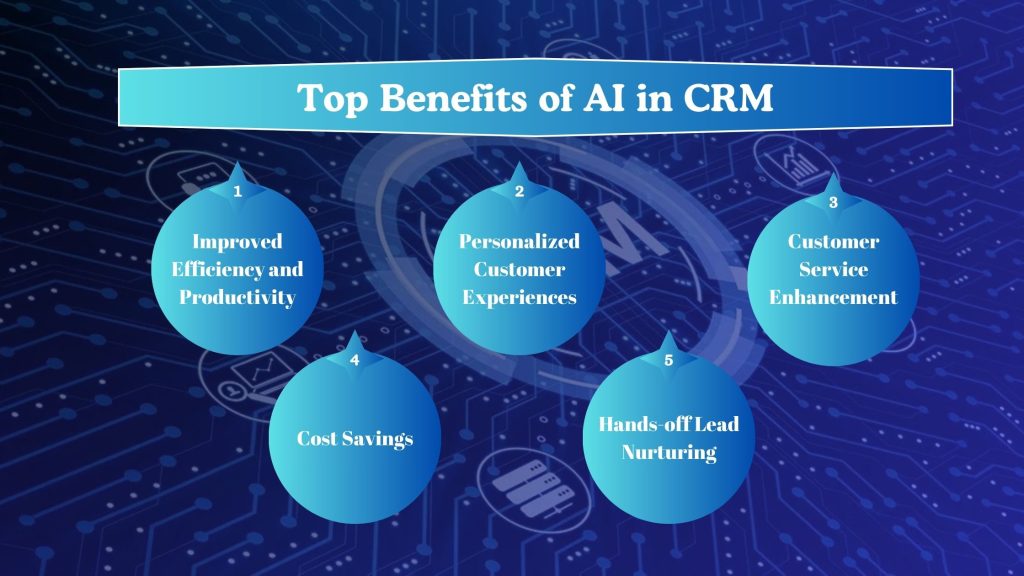
Integrating Artificial Intelligence in CRM brings measurable advantages that go beyond business process automation. It transforms CRM systems into intelligent platforms that actively support sales, marketing, and customer service teams.
By leveraging AI CRM software, businesses not only optimize workflows but also improve customer relationships through personalized and data-driven strategies.
Here are some of the top benefits:
Improved Efficiency and Productivity
AI-powered CRM solutions streamline repetitive tasks such as data entry, scheduling, and customer follow-ups. Teams spend less time on manual processes and more time on activities that directly contribute to growth. Intelligent automation also reduces the margin for human error, keeping records accurate and up to date.
You Might Also Like
Intelligent Automation Vs. Artificial Intelligence: Key Differences
Personalized Customer Experiences
Customers expect personalized interactions, and AI in CRM makes this possible at scale. By analyzing behavior, preferences, and purchase history, AI can recommend products, customize offers, and deliver relevant content. This level of personalization builds loyalty and makes customers feel valued.
Customer Service Enhancement
AI CRM platforms often include virtual assistants or chatbots capable of handling routine queries instantly. This improves response times, ensures 24/7 availability, and frees up human agents to handle complex issues. Over time, AI learns from past conversations, providing even better responses and more consistent support.
Cost Savings
Automation in CRM reduces the need for extensive manual effort, lowering operational costs. Businesses can reallocate resources more strategically, focusing on innovation and customer engagement rather than routine administrative work. Additionally, predictive analytics helps minimize costly customer churn.
Hands-off Lead Nurturing
AI automates lead nurturing by sending personalized communications at the right time without constant manual input from sales teams. Whether it’s follow-up reminders, tailored offers, or product education, AI ensures leads move steadily through the sales funnel, improving conversion rates.
10 Top AI CRM Use Case Examples That Businesses Implement
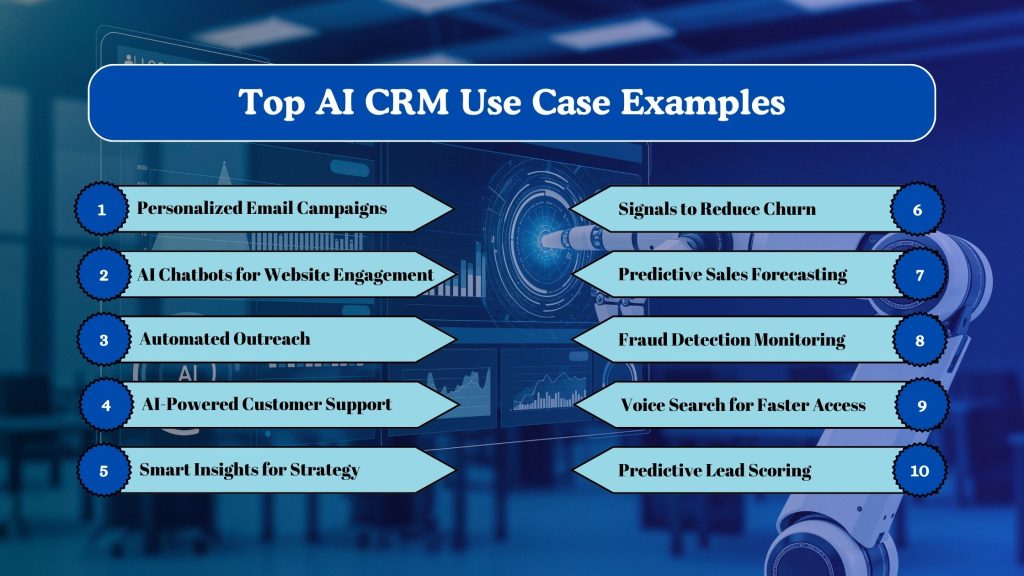
The adoption of Artificial Intelligence in CRM is rapidly growing because it delivers practical solutions to everyday challenges in sales, marketing, and customer support.
Companies are no longer just using CRM platforms as databases—they’re leveraging AI CRM software to automate, predict, and personalize at every stage of the customer lifecycle.
Here are ten impactful AI CRM use cases businesses are actively implementing today:
Personalized Email Campaigns
Instead of sending one-size-fits-all messages, AI CRM platforms craft tailored email campaigns using customer purchase history, browsing patterns, and engagement data. This increases open rates, boosts click-throughs, and drives conversions by ensuring the right message reaches the right person at the right time.
AI Chatbots for Website Engagement
AI-powered lead chatbots provide instant assistance to website visitors, guiding them through products, answering FAQs, and even qualifying leads. This not only improves the user experience but also ensures that potential customers receive quick responses, reducing bounce rates and increasing engagement.
Automated Outreach with Personalization
CRM systems integrated with AI can automatically schedule and send outreach messages across channels like email, SMS, or social platforms. These communications are personalized using predictive analytics, making outreach feel more human and timely while reducing the workload for sales teams.
AI-Powered Customer Support
Customer service is transformed with AI CRM tools that can resolve simple queries automatically and escalate complex issues to human agents with full context. This hybrid model boosts satisfaction rates by providing fast, consistent support while still keeping the human touch where needed.
Smart Insights for Strategy
AI in CRM platforms helps managers make informed decisions by highlighting trends in customer behavior and sales data. For example, insights into which campaigns work best or which products resonate most with certain demographics allow businesses to refine their strategies for higher impact.
Signals to Reduce Churn
AI algorithms track early warning signs such as declining engagement, reduced spending, or negative sentiment in communications. By spotting these patterns, businesses can proactively re-engage at-risk customers with special offers, personalized outreach, or improved service before they churn.
Predictive Sales Forecasting
One of the most valuable AI CRM use cases is accurate sales forecasting. By analyzing historical data, current pipeline activity, and market conditions, AI models predict future sales trends. This allows companies to set realistic targets, allocate resources effectively, and make smarter financial decisions.
Fraud Detection Monitoring
For businesses handling sensitive transactions, AI-powered CRM systems can flag unusual behavior that might indicate fraud. For instance, sudden changes in purchase patterns or login attempts from unusual locations trigger alerts, helping organizations maintain security and protect customer trust.
Voice Search for Faster Access
AI-enabled CRM software increasingly supports voice assistants, allowing sales and support teams to pull up customer data or update records using simple voice commands. This improves efficiency, especially in fast-paced environments where quick access to information is critical.
Predictive Lead Scoring
Instead of manually guessing which leads are worth pursuing, AI assigns predictive scores based on behavior, demographics, and engagement data. This helps sales teams prioritize high-quality leads, shorten the sales cycle, and improve overall win rates.
Want to Drive Business Growth with AI in CRM?
Implement AI CRM software to optimize workflows, improve engagement, and increase customer loyalty effortlessly.
4 Top AI-Powered CRM Tools to Explore in 2025
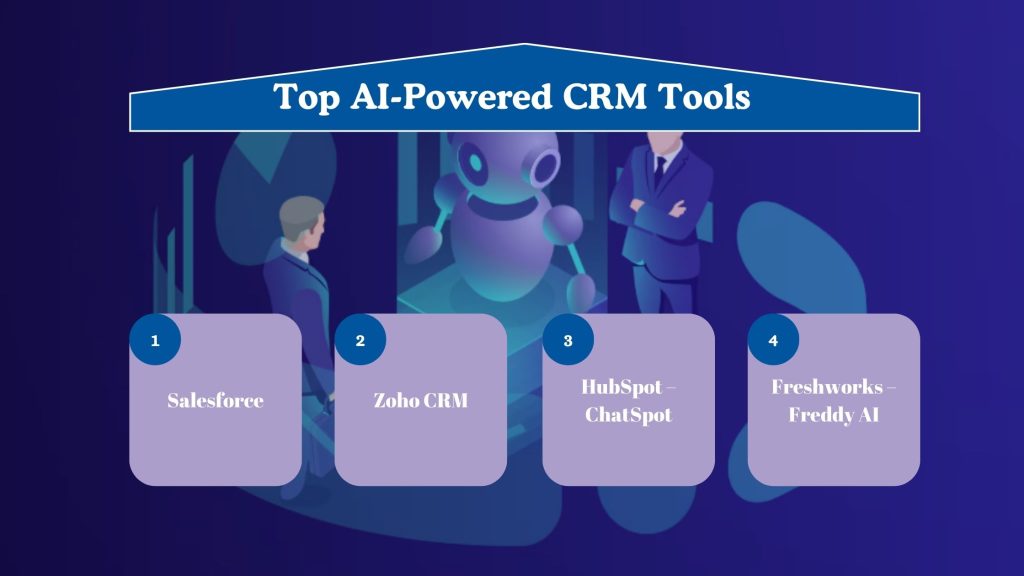
As businesses continue adopting Artificial Intelligence in CRM, leading platforms are integrating advanced AI features to stay ahead of customer needs. These tools combine automation, predictive insights, and personalization, making CRM solutions smarter and more efficient.
Below are four AI CRM platforms that stand out in 2025:
Salesforce
Salesforce remains one of the most widely used CRM solutions, and its Einstein AI feature takes automation and analytics to the next level. Einstein helps businesses predict customer behavior, recommend next best actions, and even automate workflows across sales, service, and marketing.
With strong customization and integration capabilities, Salesforce continues to be a top choice for enterprises seeking scalable AI CRM software.
Zoho CRM
Zoho CRM integrates AI through its assistant, Zia, which analyzes customer interactions, predicts deal closures, and automates routine activities. Zia can also detect sentiment in emails, suggest workflow optimizations, and provide actionable insights in real time.
For small to medium-sized businesses, Zoho offers an affordable yet powerful AI CRM platform.
HubSpot – ChatSpot
HubSpot has introduced ChatSpot, an AI-powered conversational assistant that helps users manage CRM tasks more efficiently. From drafting personalized emails to generating reports and pulling up customer details, ChatSpot simplifies operations with natural language commands.
It’s designed to save time while providing quick, data-driven responses, making HubSpot a strong contender in the future of CRM.
Freshworks – Freddy AI
Freshworks enhances its CRM suite with Freddy AI, a feature built to deliver predictive lead scoring, conversational support, and intelligent recommendations. Freddy helps sales teams identify the most promising leads, automates customer responses, and offers insights to improve decision-making.
Its user-friendly interface makes it a preferred option for businesses that want advanced features without complexity.
Steps to Integrate AI into Your CRM System
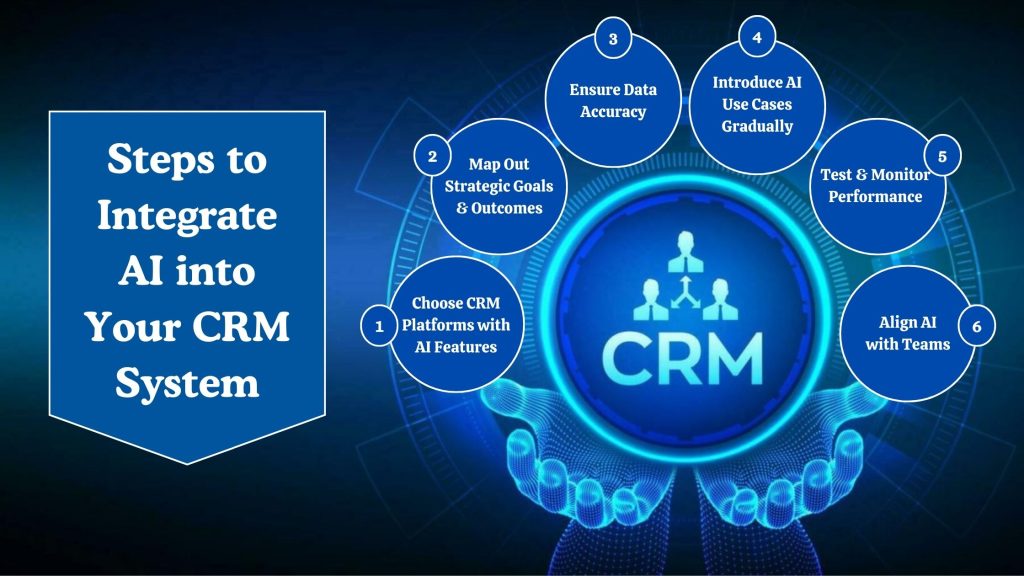
Adopting Artificial Intelligence in CRM requires a structured approach to ensure smooth implementation and measurable results. Businesses that jump in without proper planning may struggle with data inconsistencies, unclear goals, or low adoption rates among teams.
To avoid these challenges, it’s important to follow a step-by-step process.
Choose CRM Platforms with AI Features
The first step is selecting a CRM solution that offers built-in AI tools or supports third-party AI integrations. Popular platforms like Salesforce, Zoho, and HubSpot already come with advanced AI features. Choosing the right platform depends on business size, budget, and the level of customization required.
Map Out Strategic Goals & Outcomes
Before deploying AI, businesses should define what they want to achieve. Is the goal to improve lead scoring, enhance customer service, or automate marketing campaigns? By setting measurable outcomes, organizations can ensure AI supports overall business objectives rather than becoming an isolated add-on.
Ensure Data Accuracy
AI systems rely heavily on data quality. If the CRM contains outdated or inconsistent data, the insights generated will not be reliable. Businesses should clean and standardize their datasets, ensuring that customer information is complete and accurate before enabling AI-driven processes.
Introduce AI Use Cases Gradually
Instead of implementing all AI features at once, companies should start small. For example, they might begin with predictive lead scoring or automated email campaigns. Gradual integration allows teams to adapt, learn, and build confidence with AI CRM software before expanding its use across departments.
Test & Monitor Performance
Continuous monitoring is key to measuring whether AI-driven CRM initiatives are delivering results. Businesses should test models, track KPIs, and adjust workflows based on performance data. This ensures the AI implementation remains aligned with business goals and customer expectations.
Align AI with Teams
AI in CRM works best when teams embrace it as a supportive tool rather than a replacement. Training employees on how to use AI features effectively helps maximize adoption. Collaboration between sales, marketing, and customer service ensures the technology supports cross-functional needs.
Ethical and Responsible Use of AI in CRM
While Artificial Intelligence in CRM unlocks enormous potential, businesses must also address the ethical challenges that come with it. Customers trust organizations with their data, and mishandling that trust can damage relationships beyond repair.
To ensure AI CRM platforms are used responsibly, companies need to prioritize ethics, fairness, and transparency.
Protecting Customer Data
AI-powered CRM solutions rely on large volumes of personal and behavioral data. Safeguarding this information with strong encryption, access controls, and compliance with privacy regulations (like GDPR) is critical.
Customers should feel confident that their data is being used only to improve their experience, not exploited for unrelated purposes.
Avoiding Bias
AI models are only as fair as the data they are trained on. If historical data contains biases—such as favoring certain demographics—AI predictions may unintentionally reinforce them. Businesses must actively monitor their AI CRM software for bias, retrain models regularly, and ensure decisions remain inclusive and objective.
Transparency & Explainability
Customers and employees should understand how AI in CRM arrives at its insights or predictions. For example, if a lead is given a high score, teams need to know why. Providing transparency builds trust and makes it easier for users to rely on AI-generated recommendations without hesitation.
What’s Next for AI in CRM
The future of CRM is inseparable from Artificial Intelligence. As technology advances, AI CRM platforms will evolve into even more predictive, personalized, and autonomous systems.
Businesses that embrace these innovations early will gain a competitive advantage by creating seamless customer journeys and optimizing their internal processes.
Here are some of the key trends shaping what’s next:
Smarter Personalization
AI will move beyond simple recommendations to deliver hyper-personalized experiences. CRM systems will combine data from multiple channels—email, social, website behavior, and purchase history—to craft messages that feel uniquely tailored to each customer in real time.
Better Predictive Insights
Next-generation AI CRM software will offer deeper predictive analytics, from forecasting customer lifetime value to identifying untapped market opportunities. These insights will allow businesses to anticipate customer needs and respond before they even arise.
Automated Customer Communication
Future CRM solutions will rely heavily on AI to handle end-to-end communication workflows. Intelligent virtual assistants will not only respond to queries but also follow up with reminders, schedule meetings, and handle transactions without human intervention.
Advanced Analytics
AI will enhance CRM reporting with more intuitive dashboards, natural language queries, and actionable insights. Teams will be able to ask their CRM systems questions—like “Which leads are most likely to close this month?”—and receive accurate answers instantly.
Upgraded Support Tools
Customer support will evolve with advanced tools such as emotion detection in voice calls, contextual knowledge bases, and proactive assistance. This will make AI in CRM a critical factor in driving higher satisfaction and loyalty across industries.
Driving CRM Success with BigDataCentric AI Solutions
Implementing Artificial Intelligence in CRM is one thing, but achieving tangible business outcomes requires the right strategy, tools, and expertise.
This is where BigDataCentric comes in, offering end-to-end AI-powered CRM solutions that help businesses optimize customer interactions, automate workflows, and make data-driven decisions.
BigDataCentric specializes in integrating AI CRM software with existing systems, ensuring seamless adoption and minimal disruption. Our solutions help companies leverage predictive analytics, personalized engagement, and automated lead nurturing to increase conversions and improve customer retention.
By working with BigDataCentric, organizations gain access to:
- Custom AI CRM strategies tailored to business goals
- Predictive insights that forecast sales trends and customer behavior
- Intelligent automation to reduce manual effort and enhance efficiency
- Advanced analytics for real-time decision-making
Whether it’s enhancing customer service with AI chatbots or optimizing marketing campaigns through intelligent segmentation, BigDataCentric empowers businesses to fully realize the potential of AI in CRM.
This ensures that CRM platforms not only store customer data but actively drive smarter strategies, better relationships, and measurable growth.
Want to Boost Sales and Customer Engagement with AI?
Leverage AI CRM tools for predictive insights, smarter lead management, and automation that drives growth.
A Final Word
Artificial Intelligence in CRM is no longer a futuristic concept—it’s a practical tool transforming how businesses manage customer relationships today. By integrating AI into CRM platforms, companies can automate repetitive tasks, gain actionable insights, and deliver personalized experiences that drive engagement, loyalty, and revenue.
From predictive lead scoring to intelligent chatbots, AI CRM software enables smarter decision-making, higher productivity, and a more proactive approach to customer management.
As technology continues to evolve, businesses that embrace AI in CRM will stay ahead of the competition, ensuring their strategies are data-driven, efficient, and customer-focused.
Partnering with solutions providers like BigDataCentric allows organizations to implement AI responsibly and effectively, maximizing the benefits of modern CRM systems.
With the right approach, AI in CRM is not just a tool—it’s a strategic advantage that shapes the future of customer relationship management.
FAQs
-
Is an AI CRM difficult for a small business to implement and use?
AI CRM platforms are increasingly designed to be user-friendly and scalable. Small businesses may need initial setup and training, but many solutions offer intuitive dashboards, pre-built automation, and guided onboarding to simplify implementation.
-
What specific AI features are included in an AI CRM?
AI CRMs often include predictive lead scoring, automated email campaigns, chatbots for customer support, sentiment analysis, workflow automation, and advanced analytics to provide actionable insights.
-
Can AI in CRM provide predictive insights for sales teams?
Yes, AI in CRM can analyze historical data and customer behavior to forecast sales trends, identify high-value leads, and suggest optimal follow-up actions, helping sales teams prioritize efforts effectively.
-
Can AI assist in tracking customer satisfaction in CRM?
Absolutely. AI can monitor customer interactions, detect sentiment from emails or chats, and generate real-time satisfaction scores, allowing businesses to proactively address issues and improve the customer experience.
-
How does AI help automate routine CRM tasks?
AI automates repetitive tasks like data entry, scheduling follow-ups, email outreach, and report generation. This frees up teams to focus on strategic initiatives while maintaining accurate and timely customer records.

About Author
Jayanti Katariya is the CEO of BigDataCentric, a leading provider of AI, machine learning, data science, and business intelligence solutions. With 18+ years of industry experience, he has been at the forefront of helping businesses unlock growth through data-driven insights. Passionate about developing creative technology solutions from a young age, he pursued an engineering degree to further this interest. Under his leadership, BigDataCentric delivers tailored AI and analytics solutions to optimize business processes. His expertise drives innovation in data science, enabling organizations to make smarter, data-backed decisions.
Table of Contents
ToggleHere's what you will get after submitting your project details:
- A strict non-disclosure policy.
- Get in discuss with our experts.
- Get a free consultation.
- Turn your idea into an exceptional app.
- Suggestions on revenue models & planning.
- No obligation proposal.
- Action plan to start your project.
- We respond to you within 8 hours.
- Detailed articulate email updates within 24 hours.
Our Offices
USA
500 N Michigan Avenue, #600,Chicago IL 60611




